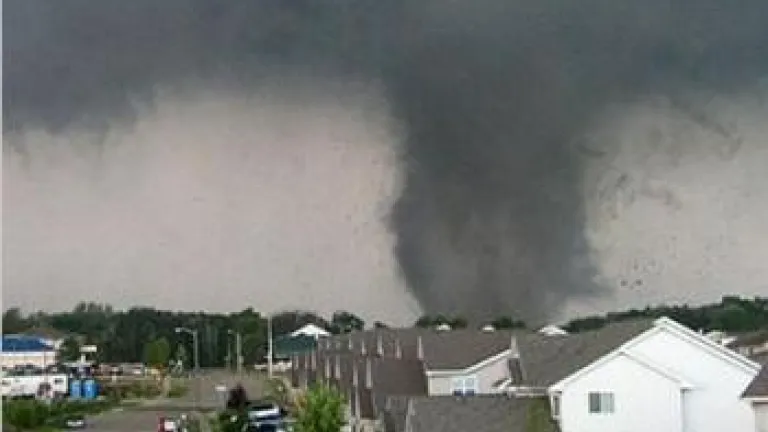Why Does God Allow Natural Disasters?

Jesus clearly explained what should be learned by a disaster or calamity in life.
Natural disasters from around the world grab the news headlines more than we may realize. By far, in terms of destruction of property, the 2025 wildfires in the Los Angeles, California area will go down in history as the costliest disaster ever of around $250 billion. However, though the exact total is not fully known, the death toll stats currently are under thirty.
Other national disasters, depending on how far back we look, have claimed many more lives. The great Galveston, Texas hurricane of 1900 had fatalities approximated to be 6,000-12,000. It remains the deadliest natural disaster in North American history. On September 8, 1900, a hurricane with 140 mph (225km/h) winds swept through Galveston, an island off the coast of Texas and one of its biggest port cities; it literally swept it off the map.
Livescience.com reported, “Natural disasters are devastating events that have the potential to cause huge amounts of damage and loss of life. Globally, around 60,000 people die each year as a result of disasters such as droughts, floods, earthquakes and tsunamis, and a further 150 million people are impacted by these events…”
With each disaster, by whatever means, many lives are affected. We know God is all-powerful. Why does He allow these destructive and deadly natural disasters?
Does God cause natural disasters?
It is certainly true God, the Creator of all things, also created the weather patterns which occur on earth. God designed the earth to cleanse itself from time to time. Wildfires ignited by lightning burn dead underbrush and trees in the forests, and then the forests rebound over time. Weather is a powerful force, and man is weak by comparison to the devastation it can exert. Humans cannot control a raging hurricane, rushing flood waters, or a great wildfire. While man cannot control what nature will do, he can properly prepare for an eventual disaster.
When God was preparing ancient Israel for entry into the promised land, He admonished them how they could avoid potential problems, by obeying Him. He told them if they would submit and be obedient, He would be their protector. God said He would even give them rain in due season; He showed them He had power to manipulate the weather. If they obeyed God, He would have respect for them. Their crops would produce abundant grain and their trees would bear much fruit (Leviticus 26:4, 9-10).
But, God said if they chose not to obey His commandments, it would be disastrous: “I will break the pride of your power; I will make your heavens like iron and your earth like bronze. And your strength shall be spent in vain; for your land shall not yield its produce, nor shall the trees of the land yield their fruit” (Leviticus 26:19-20).
That passage in Leviticus reveals the answer to our question, “Does God cause natural disasters?” God could cause natural disasters to occur as a warning to an unrepentant people. He could use nature to punish cocky human beings and cause them to realize how very little strength they have. But, in most cases, God doesn’t have to cause a natural disaster, He simply refrains from intervening to stop it.
God doesn’t desire anyone to suffer or die
God is merciful, and He implores Israel to repent and turn from their evil ways. In Ezekiel 33:10-11, God said to the prophet Ezekiel: “And you, son of man, say to the house of Israel, thus have you said: ‘Surely our transgressions and our sins are upon us, and we rot away because of them. How then can we live?’ Say to them, ’As I live,’ declares the Lord God, ’I have no pleasure in the death of the wicked, but that the wicked turn from his way and live; turn back, turn back from your evil ways, for why will you die, O house of Israel?’”
Jesus clearly explained what should be learned by a disaster or calamity in life. When someone is hurt or killed in a tragic circumstance, others ask the question, what did they do wrong? What sin did they commit that God punished them?
During the time of Christ there were horrible tragedies where many people died. People asked Jesus about the Galileans who were slaughtered by Pilate and their blood was mingled with their sacrifices; Jesus said in Luke 13:2-5: “Do you suppose that these Galileans were worse sinners than all other Galileans, because they suffered such things? I tell you, no; but unless you repent you will all likewise perish. Or those eighteen on whom the tower in Siloam fell and killed them, do you think that they were worse sinners than all other men who dwelt in Jerusalem? I tell you, no; but unless you repent you will all likewise perish.”
Jesus Christ stressed it was improper to make the judgment God was punishing someone, but rather, everyone should take warning—every person should repent in case sudden tragedy should strike them.
God speaks to us through His Son
God is always speaking to each of us, and here is how God has spoken: “God, who at various times and in various ways spoke in time past to the fathers by the prophets, has in these last days spoken to us by His Son, whom He has appointed heir of all things, through whom also He made the worlds…Therefore, we must give the more earnest heed to the things we have heard, lest we drift away. For if the word spoken through angels proved steadfast, and every transgression and disobedience received a just reward, how shall we escape if we neglect so great a salvation” (Hebrews 1:1-2, and 2:1-3).
This is how God has spoken—through His Son! God speaks through the Bible to give us the truth and God’s words of warning. There is no other book like it, no other book records the words of God!
Even so, when disasters strike, most are not sobered enough to take stock of their own spiritual lives. There were times when God brought severe judgments on Jerusalem:
“For thus says the Lord God: ‘How much more it shall be when I send My four severe judgments on Jerusalem—the sword and famine and wild beasts and pestilence—to cut off man and beast from it? Yet behold, there shall be left in it a remnant who will be brought out, both sons and daughters; surely, they will come out to you, and you will see their ways and their doings. Then you will be comforted concerning the disaster that I have brought upon Jerusalem, all that I have brought upon it. And they will comfort you, when you see their ways and their doings; and you shall know that I have done nothing without cause that I have done in it,’ says the Lord God” (Ezekiel 14:21-23).
In the end, there will be those who will not repent despite the plagues God will pour out upon the earth: Revelation 16:9 warns us: “And men were scorched with great heat, and they blasphemed the name of God who has power over these plagues; and they did not repent and give Him glory.”
Ultimately, when tragedy strikes, God wants it to yield greater righteousness in each of us. For the most part, the wildfires of 2025 in Southern California did not touch us physically, but there is a careful and humble reminder for all of us: “There but for the grace of God go I.”





